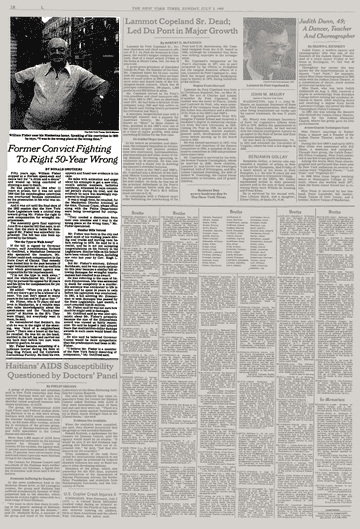As a teenager, Izzy Zimmerman was framed for the 1937 murder of a Manhattan detective. Nearly electrocuted at Sing Sing, beaten almost to death at Attica, he walked out of prison after 25 years and won the right to sue New York State. “When I get my money,” he swore in 1982, “we’ll all go for Chinese food.”
__________________________________
The walls and tall shelves of the Paperback Exchange were canary yellow by day, and at night became a pale fluorescent green, along with the patrons. When I worked there in high school we took in old paperbacks (Signets, Avons, Bantams, Dells) and Sharpied out the original prices before labeling them with a gun and selling for “half-off” the new amount. This brought complaints from customers when the marker smudged off, but usually their itch for Asimov or Spillane or The Happy Hooker would override their grievance. They needed these books, and on Third Avenue in the East Thirties there wasn’t a lot else open at night except for old man bars.
The owners kept Sabbath by closing the bookstore on Fridays before sundown, then had us open after dark on Saturday nights and stay late; often in summer it was three a.m. when I rolled the gate down. Some of these long nights I shared with a kid my age named Stephen Dowling, and the two of us often killed time between customers by arguing about capital punishment. It was like a knitting project we could put down when there was a line at the register, then take up again without dropping a stitch. The death penalty had returned as a national subject largely due to Garry Gilmore’s campaign to have himself executed in Utah, and Norman Mailer’s book about the Gilmore case, The Executioner’s Song.
One quiet Saturday night, Stephen and I were back to our familiar debate under the humming lights when in walked a stocky older Jewish man with big, square glasses framing his mismatched eyes. He smiled and requested a work I’d never come across, “Do you have Punishment without Crime by Isidore Zimmerman?” He wasn’t the first writer to coyly ask for his own obscure book. “Sorry,” I said. “Is it about Dostoevsky?”
Still genial, he focused his eyes on me and launched into a monotone speech he had probably unspooled many times: “It’s my life story about how I was framed for murder and was two hours from being killed when I was commuted by the governor. I served 24 years and eight months and last year Gov. Carey finally allowed me to sue New York State.” The eyes, I later learned, looked strange from a beating he’d suffered at the hands of anti-Semitic guards, an assault that also fractured his skull. He asked us to place a card in the store, advertising for copies of his forgotten book.
It’s not often that the living proof of your position wanders into an argument as you are having it. After we watched him walk out of the bookstore I started up again with Stephen, See? That guy was innocent and he was almost killed. But Stephen recovered well. But he wasn’t, he said. The system worked. Izzy came in once more when I was working, to check on his sign and ask again about his lost book. “When I get my money,” he said, “we’ll all go for Chinese food.”
***
In the early hours of April 10, 1937 Detective Michael J. Foley and his partner John Gallagher made their way up the stairs to a lower East Side coffee house and gambling spot at 144 Second Avenue, near ninth street. It was a second-floor loft space called alternately the Boulevard Restaurant and “Willie the Dutchman’s,” in honor of its owner Sam ‘Willie’ Kupenstein, who ran a late-night pinochle game whose players tonight included a cabby and Merchant seaman, two off-shift waiters, and a window washer.
Since the Dutchman’s had been robbed just the month before (for $1500 in cash and jewels), the two officers visited the restaurant several times a week, thinking it vulnerable. This thought also inspired the four novice stick-up men who entered around 3:20 a.m., minutes after Detectives Foley and Gallagher had joined the owner for coffee and a glass of milk. From the doorway came the shout, “This is a stick-up!” then one of the men approached the owner’s table, ordering Kupenstein and the civilian-looking plainclothes officers to move back into the room, hands raised, with the others.
Instead, Foley and Gallagher pulled their weapons and fired from the table, Foley hitting John Harvey O’Loughlin, who was dragged downstairs by another of the gang. Foley said to his partner, “They got me!” but still held two robbers at bay with his emptied .38 Banker’s Special long enough for the crowd to overpower them. A taxi driver from the Dutchman’s pinochle game drove Detective Foley to nearby Post Graduate hospital, where some 18 hours after the shootout, he died of gunshot wounds to his stomach. He was given the honor of an inspector’s burial, and the hunt was on for the remaining boys who’d killed a hero cop.
The wounded robber, ‘Harvey’ O’Loughlin, had been hit in the left arm and between the ribs but survived; after a splint and a blood transfusion, he was transferred to the prison ward at Bellevue. Police brought in the crew that had tried to hit the Dutchman’s, who eagerly gave up other names. All of the suspects were lower East Side boys, whose ages ran from 17 to 27, and who otherwise scrounged as shoeshines, truckmen, movie ushers, and pool hall rackers. None of them was Izzy Zimmerman from Rutgers street, then a 19-year-old senior at Seward Park high school and a good enough tackle to have attracted the interest of Columbia’s football coach. After the first two boys began talking, however, Izzy was accused of supplying the murder weapon in the death of Detective Foley.
The three guns brought to this caper had all been stolen, including the fatal black .38 Smith & Wesson, which originated with a sixteen-year-old who sneaked it out of his father’s butcher store. According to Izzy, a hoodlum high school acquaintance named Danny Rose shouted to him when he passed a social club early on the night of the robbery, asking would he carry a hat and coat to another boy waiting at the neighborhood candy shop where Izzy often went anyway. Izzy agreed, but when he got there, the recipient asked him to return the jacket to Rose, explaining he had a “hot date.” It was not clear from Zimmerman’s police statements if he ever thought Rose’s jacket contained a pistol; it’s not clear that it did. The two young men who accused Izzy of conspiring were not charged themselves, and the owner of the candy store remembered seeing Zimmerman drinking a soda at an alleged planning meeting for the heist, but could not hear anything that was said across the busy room.
Several of the other men indicted for the murder Izzy claimed he’d never even met. “I introduced myself at the Tombs while we were awaiting trial,” he later told the Daily News. “The guy who was the ringleader, O’Laughlin, laughed when I met him. ‘You ain’t with us, kid,’ he said, ‘and you ain’t going to the chair with us.’” They were happy to name him to the District Attorney, but he wasn’t part of their hard-guy club, even in death.
“For nine months, I had been rehearsing my death,” Zimmerman remembered, “dying a little every day, dying a little more every night, while just up the hall they were killing men.”On a Friday night in January 1939 Izzy was nevertheless on the docket with the others in the Death House at Sing Sing. For months he had watched men walk to the chair, some wet themselves as they passed down the hall and others he heard wailing in their cells at night as their date approached. “For nine months, I had been rehearsing my death,” Zimmerman remembered, “dying a little every day, dying a little more every night, while just up the hall they were killing men.” This was to be the prison’s largest night of electrocutions in almost two decades, and the warden had sent his own phonograph down to the “dance hall” so the young men could each request a final sentimental song —‘Did Your Mother Come from Ireland?’ ‘Pal of My Cradle Days’, ‘It’s a Sin to tell a lie’—as well as choose their last meal.
Izzy’s head was shaved and his trouser leg slit to fit the electrodes. The tune he called for was ‘Ah, Sweet Mystery of Life.’ He spent his last afternoon with his father and two brothers. “Mama didn’t come; it would have been too much for her….We had three hours together. It was more than enough to make arrangements for my funeral, to give them the last messages I thought out for the family.” The 20-year-old instructed his father, “Tell them I died a good death with expectations of a better world.”
Two hours before his late-night appointment in the chair his mother was keeping a candlelight vigil at home when a deputy warden stopped by Izzy’s cell, “Zimmerman, You’re not dying tonight.” His death sentence had been commuted to life imprisonment by Governor Lehman, who didn’t like that it relied on the testimony of accomplices in the crime. He had grown so accustomed to the fact of his coming death that Izzy told the deputy warden he didn’t want clemency. He was furious at the thought of his hardworking parents paying for lawyers the rest of his incarcerated life. “You have nothing to say about it,” came the answer. That night, Lehman spared only one other boy from the Foley murder, Philip Chaleff, whose own father, a Canal Street tinsmith, went immediately to the lower East Side funeral parlor he’d booked for his son’s service, “No sale!” he taunted the funeral director. “You can’t have my boy!”
***
After moving back into the general population at Sing Sing Izzy was quickly transferred to Auburn State Prison, where his penal education continued among “schlep men” (petty thieves), “hack lovers” (inmates who served the guards), “pete men” (safecrackers), “rats” and “short heisters” (pedophiles). The rare inmate who refused to “act like an animal” was known simply as “a man.” Izzy heard about Pearl Harbor at Auburn, patriotically bought War bonds and gave enough blood to join the Gallon Club. But one of the few pleasures of his prison career came with the arrival at Auburn of members of the fascistic German American Bund, who had obeyed the command of the bund’s fuehrer Fritz Kuhn to defy the draft.
“Some of the boys used to go out of their way to start fights with the ‘supermen’…I remember banging one of the bundsmen around for close to an hour—he’d sat down next to me in the sun and opened the conversation with some standard gambit about ‘The Jews’—while a bunch of people who felt the same way I did about the Bund stood around screening our exercise from the view of the guards.”
Fighting was of course forbidden for inmates and even sympathetic guards were required to eventually punish them, “But we’d generally enjoyed ourselves so much that the punishment didn’t matter.” Gradually, the Bundsmen feared the exercise yard enough that they hid in the shops where they performed their prison jobs. For Izzy, and for the would-be Supermen he throttled, this was the closest they got to the War.
Believing he was innocent made him a more defiant prisoner, since no time could be added to his life sentence as a deterrent. In July 1947 he was sent to the notorious Attica, where four guards beat him savagely in the elevator (called the “Bucket of Blood”) that led to the solitary cells. (The incident cost him 90 per cent of his vision in his right eye.) In fact, Izzy’s eight combined months in solitary at Attica may have saved his life by keeping him away from predatory guards who could easily bait him into fighting.
Zimmerman would wish for the courage to kill himself, but, he told a reporter in 1981, “I was a tough guy, you know? They thought I would be dead when they opened the door after 87 days, but I wasn’t. I was as tough as the guards.”After he emerged one time from months alone in irons, with a Monte Cristo-like beard and wild shock of hair, smelling “like a goat” and looking “like a village idiot,” the warden declared him insane. A kindly prison psychologist disagreed, prescribing instead a shower and shave and return to general prison society, such as it was. Transferred as a troublemaker to Greenhaven in 1950, his new warden punished him by refusing him food for a year; his inmate friends kept him alive with pilfered scraps. The system, Zimmerman would explain, “is meant to break men, not mend them.” Many times in the strip cells, lying naked in his own filth, Zimmerman would wish for the courage to kill himself, but, he told a reporter in 1981, “I was a tough guy, you know? They thought I would be dead when they opened the door after 87 days, but I wasn’t. I was as tough as the guards.” After one of them spat in his meal, bragging “I spiced it up for you, Jew boy,” Izzy threw it back and stuck to bread and water.
It was at Dannemora during his last decade of prison that he finally encountered a responsible warden and became known as a successful jailhouse lawyer, the subject he had hoped to study at Columbia. He helped other inmates with their appeals, even writing their love letters home if the wife threatened divorce. In 1956, two witnesses from his original murder case finally recanted, saying they had been pressured by the D.A., but their admission was not enough to overturn Izzy’s conviction. When the Court of Appleals did find for him six years later, “I was in my cell, writing, when I heard the guys cheering,” Zimmerman remembered. “I yelled, ‘Knock it off, I can’t think with all the noise.” The ruling had been on the news.
***
Izzy returned to what he called “a strange city” on February 2nd, 1962. He was a 43-year-old man in a baggy suit moving back in with his father in the old neighborhood. Unable to get to sleep on his homecoming night, he toasted his new freedom with whiskey while fiddling with the dials of his first television; giving up, he moved to the window and watched the cold night sky: “Suddenly it occurred to me that in all those years of prison I’d never seen the stars, and…it seemed the most wonderful of privileges to be able to stand at a window and look out at the winter night.”
 But he would find much of his old lower East Side neighborhood unrecognizable from the lively place he’d left during the Depression. Tenements had been replaced with housing projects and the streets seemed eerie at night. It took him ten months to find a job—it wasn’t what he’d done or not done but where he’d been. Hired by one company, the office women threatened to quit; a kitchen union blocked him from a restaurant job. A hack license required three years’ driving experience, which he’d never acquired in jail. And as a lifer not expected to return to society, he had also never been taught a trade. He worked for a time as a warehouseman.
But he would find much of his old lower East Side neighborhood unrecognizable from the lively place he’d left during the Depression. Tenements had been replaced with housing projects and the streets seemed eerie at night. It took him ten months to find a job—it wasn’t what he’d done or not done but where he’d been. Hired by one company, the office women threatened to quit; a kitchen union blocked him from a restaurant job. A hack license required three years’ driving experience, which he’d never acquired in jail. And as a lifer not expected to return to society, he had also never been taught a trade. He worked for a time as a warehouseman.
What could possibly compensate him for his stolen life? Despite the legal doctrine of sovereign immunity (the King can do no wrong and so can’t be sued) he took the unusual step of seeking damages from the state that had almost killed him. When news broke of his lawsuit, tabloids called the amount he wanted —one million dollars—a “whopping” sum, bringing him scads of hateful letters. To explain himself, he wrote his prison memoir, Punishment Without Crime, which alternates a patient legal history by his co-writer Francis Bond with Izzy’s first-person nightmare of his “long gray tunnel of days” inside.
Over twenty more years, working as a Manhattan doorman while waiting for his case to break, he upped his ask to $10 million. The New York State legislature passed bills on his behalf in 1969, 1970, and 1971, allowing his private right to seek compensation for prosecutorial misconduct. But Gov. Nelson Rockefeller, who signed many of New York’s most notorious modern crime laws, vetoed all three bills. Then, in 1981 a new governor, Hugh Carey, signed fresh legislation that threw the case to the New York Court of Claims.
Thirty five years ago, Zimmerman at last won his case against the state. “How Much is a Zimmerman Worth?” asked the New York Times in May of 1983, noting that the Court of Claims Judge had offered no guidance in calculating his reduced award of $1 million (of which Izzy could keep around $660,000 after legal costs). He celebrated nevertheless, buying a new car with his payout that June, and taking a long weekend in the Catskills. At 66, having not had a profession for much of his life, he now had some savings for his retirement.
***
Punishment without Crime never came in for trade at the bookstore while I worked there, and we never went out for Chinese food together. But this Spring I finally bought my own copy of the 1972 Manor Books paperback, with its cover illustration of a handsomely tormented David Jansen-like prisoner. (The book cost $10 on Alibris, so I was surprised to find it recently for sale through Amazon for forty-three thousand dollars, a brazen mark-up from the $1.25 cover price we never would have tried with a Sharpie at the bookstore.)
Like a shipwrecked man whose cobbled raft has somehow returned him to shore, Zimmerman was hard put to explain his survival: “If I’m here at all,” he wrote, “…it’s only because—by the grace of God and a few people who wouldn’t give up—the system didn’t go all the way with me… the breaking of men is the main function of the system, and plenty of good men, unluckier than I, are broken by it.” In 1983, four months after getting his money, he collapsed in the street after shopping near his home in Queens. He died free and unbroken and a little bit rich, knowing there were many worse things than dying.


















